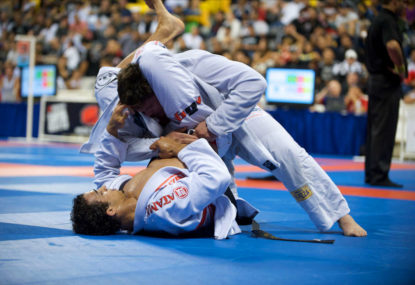JackJumpers' NBL title was special - but where does it sit among Tasmania’s top ten sporting moments?
It’s a pretty good time to be a Tasmanian sports fan right now. After years in the sporting wilderness with not much to celebrate,…

I am a Jiu Jitsu black belt. I train at least twice a day and compete at least once a month to hone my skills.
Jiu Jitsu is a high level expression of human movement, as well as being the most effective form of self-defence devised, but competing regularly is an expensive business.
Each competition normally costs over $100 to enter, at least 12-14 times a year, and including travel costs gives you a figure of around $7000 p/a. In almost every competition (with some notable exceptions) I am only fighting for a medal and myself, almost never for money, rarely for a prize. The sport is strictly amateur for the athletes.
There is, however a lot of money in Jiu Jitsu. There are many, many people who pay more than me to compete each weekend, so where does this money go?
I wonder if it is possible for Jiu Jitsu to take the same (but more limited) road to professionalism that rugby union took 20 years ago, I mean, how bad could it be for athletes to earn money for attempting to be the best they can be?
Firstly, what is Jiu Jitsu? For those who do not know, it is a grappling art involving positional dominance and submissions which has risen from obscurity in the last 20 years to something which is high profile and dominates self defence programs and Mixed Martial Arts.
Still unsure what is being discussed? See the highlight below.
Many (but far from all) practitioners in BJJ compete regularly and look to better themselves through the experience.
However, there is very little money in competing, at the recent IBJJF (International Brazilian Jiu JItsu Federation) World Championships. Marcus “Buchecha” Almeida, the winner of the Black Belt absolute division, walked away with precisely $0 yet paid over $100 to enter, as did thousands of others. Ridiculous. Unbelievable.
Brazilian Jiu Jitsu competitions exist to make money. Fact.
This is not necessarily a bad thing. Many sporting structures exist due to their ability to turn out a profit at the end of a financial year, and all of them redress this by rewarding the participants to some degree. The scale and lopsided manner to which it exists in BJJ is unprecedented and needs to be addressed.
The Australian Federation of Brazilian Jiu Jitsu (AFBJJ) is a proponent of this thinking and does not award prizes (apart from generic medals) to any participating athletes in any sanctioned competitions nationwide.
Fortunately it is not alone in holding tournaments. Tournament organisers such as Triple Bull and Grappling Tournaments Australia have held large competitions throughout the year with selected divisional winners getting a flight to the World Championships in Los Angeles/Abu Dhabi, showing it is possible to hold events which reward athletes and also make a profit.
Individual teams have also been making waves with round-robin format events (as opposed to the normal knock-out) through the year at The Dojo in Bondi, and proceeds made were reinvested into athlete development in the form of private lessons for the winners from a Sydney-based instructor of their choice.
If prizes of any kind became normal at competitions it would give more incentive to compete and result in more entries, thus substantially decreasing the cost of the prize. That way everybody wins!
So, what can be done? Here is a list of possible solutions which would improve the situation:
• Athlete Development, it is imperative some resources are redirected to the athlete, I would suggest a system where (for big competitions) White Belt winners receive private lessons, Blue, Purple and Brown get clothing/equipment vouchers and Black Belts are awarded flights to overseas competition.
• Regulation, many of the major sports in Australia are regulated by the Australian Institute of Sport or the Combat Sports Authority, it is possible these bodies could represent the participants on mass.
• Black Belts Compete for Free, there is a dearth of Black Belts competing regularly in Australia. They have been training for years and it is guaranteed that if a Black Belt competes, two or three extra students will also, so in the end the competition makes more money.
• No Spectator Fee, the prices for competition are already inflated and for friends/relations to have to pay extra should be avoided. Moreover, we want as many people to view our amazing sport as possible, we should be trying to herd them into the venue so they start training, not turning them off with extra costs.
I am an active competitor and love nothing more than stepping on the mats to improve myself.
It is my sincere belief that the sport of Jiu Jitsu can take the same route of rugby union and adopt a more professional path, it requires a desire and an ability to change. Both those factors are in place.